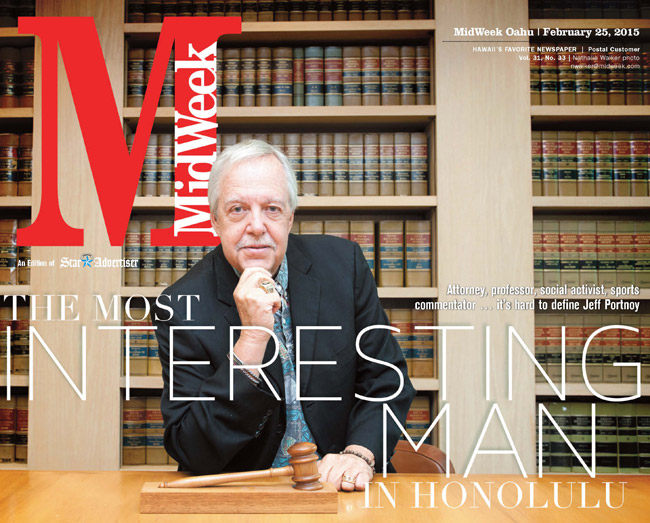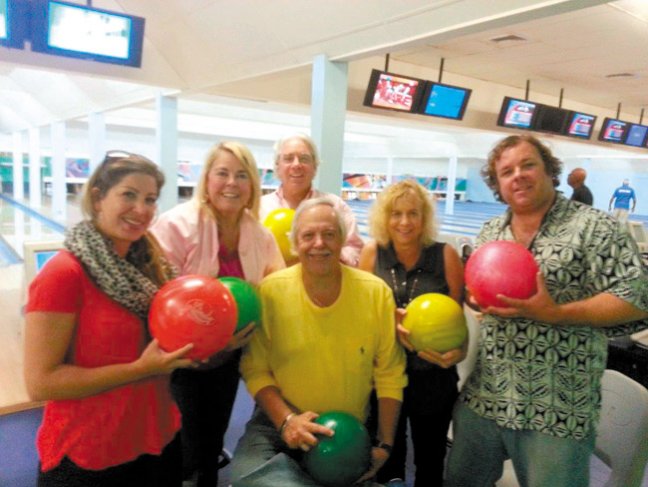The Most Interesting Man In Honolulu
When attorney Jeff Portnoy first came to the Islands four decades ago, he knew nothing about Hawaii — and now just about everyone on Oahu knows his name
Who is Jeff Portnoy? Is he the peripatetic professor touring Eastern Europe, or the family man still at his first job out of college?
mw-cover-022515-jeffery-portnoy-2
Is he a firebrand hippie born of ’60s idealism, or the voice representing the 1 percent?
Is he an ardent Duke alumnus, or was he a personal friend of Duke’s enemy No. 1, coach Dean Smith of North Carolina?
The answer to all of these is yes.
“I have had a pretty eclectic life and have been fortunate to be involved in lots of things,” admits Portnoy, a Brooklyn native who has been in the Islands since 1972.
After graduating from Syracuse University, he attended Duke University School of Law during the latter part of the 1960s, when campuses were broiling with U.S. handling of the Vietnam War.
Brought up conservative — he actually voted for Richard Nixon in 1968 — he soon joined the masses in clamoring for an end to the war. Though he says he never threw bombs, he does admit to being part of the group that talked about stealing Nixon’s portrait from the Moot Courtroom at Duke. (Nixon was a Duke grad.)
The stories here vary. Portnoy says they only spoke of stealing the portrait; the campus papers of the time say it was stolen and hidden in the ceiling of the law school. Either way, the portrait then spent the next three decades locked in a vault, and the students had their victory.
Never one to be outmaneuvered, the president invited a small group of Duke law students to Washington, D.C., to discuss student concerns about
America. While there, the students met with high-ranking officials, including Secretary of the Interior Wally Hickel, and had their voices heard — and had their pictures taken by Associated Press.
Meanwhile, there were hundreds of thousands of students marching on the Washington Memorial to protest the war. As it turned out, these photos were the perfect answer in the press to the march, showing that the administration cared about what students had to say.
Portnoy had been co-opted.
“I didn’t vote for him again in 1972,” says Portnoy, with a smile.
During his first year at Duke, he sent a resume to a small law firm in the Islands named Cades Schutte Fleming & Wright, but it turned him down as it didn’t take first-year law students.
He didn’t give it another thought until two years later, when the firm made an offer out of the blue. While a job offer is exciting to anyone coming out of school, Portnoy knew next to nothing about this remote place 5,000 miles from home.
“I knew Hawaii was west of California. I didn’t know anybody who had ever been here, and I got a job as a fluke,” says Portnoy, who at that point started watching Hawaii Five-O for research. “I was the last picture bride, never interviewed. I was just hired off of a resume.”
So, fresh off the plane, with his new bride, Sandi, his hair over his ears and heart overflowing with liberal values, he became … an insurance lawyer.
“Most of my work deals with money and economic issues, and if I think back to the late ’60s, I’d be turning over in my grave in knowing that this is what I do. But it is important to the clients, it is a job and it pays well,” explains Portnoy, top litigator for the firm.
The economic realities of caring for a young family are hard to fight, so while he became a cog in the machine, he found other outlets to serve his heart.
A professor at Duke had built a passion for First Amendment law in him, and he went about representing almost all the media outlets in the state (including the one in your hands) at one point or another. He fought battles for sunshine laws, to open courtrooms to the press and to provide a shield law for journalists to use to protect their sources.
Perhaps his proudest accomplishment on this front was when he led a team of students at UH in a lawsuit against State of Hawaii Police Officers Union (SHOPO) and City and County of Honolulu, asking for the release of the names of HPD officers disciplined for misconduct, that went to Hawaii Supreme Court.
They won, and that victory earned Portnoy a national award from Society of Professional Journalists.
He also was the first man appointed to Hawaii Commission on the Status of Women. “It entailed being around a bunch of women!” Portnoy says with a laugh, “and learning a lot about women’s issues and being in the minority. Let me tell ya, it was a fascinating experience.”
In recent years, he has combined his love for travel with his First Amendment passion and started teaching classes on the U.S. Constitution in former Soviet Bloc countries.
The experience has reinvigorated his love of our system of government.
“My guess is if you put some of these European students up against U.S. students on American history and American issues, I am not sure that sometimes European students wouldn’t score better because they are fascinated by this country and they don’t always think it is great,” says Portnoy, who credits their passion to the newness of their democratic experience.
“It is a different approach. We have had our democracy for 250 years; they were under Soviet domination up until 1990, so they are brand new, their constitution is 50 pages long, ours is two,” says Portnoy, who has taught in Poland, Estonia and Hungary, and hopes to be headed to Czech Republic later this year.
His first stint as a professor overseas (he taught media law at UH for years) was in Debrecen, Hungary, during President Obama’s first election. Portnoy offered to have a talk after the election with anyone interested. He pictured a roundtable discussion with a dozen or so students and professors; instead, he was led to the biggest auditorium on campus with every seat filled and the aisles lined with people wanting to talk about the historic election.
“They weren’t there because of me — they had no clue who I was — but because of the fascination with Obama and the election of the first black man (as president),” says Portnoy.
“I was there for two hours. Not one person left; the questions were fascinating. I was told later that it was the most people who had ever gone to an educational event in the 20-year history of the school.”
These days you regularly see that kind of passion on a U.S. campus for a sporting event, which also is a compulsion of Portnoy’s. Never an athlete as a youngster — “always the last one cut off the baseball team” — his passion for it grew as a fan, especially for his beloved Dodgers and college basketball.
He served as a host for many of the visiting teams to the Rainbow Classic basketball tournament, including the 1982 North Carolina team that featured an assistant coach named Roy Williams and a young gunner named Michael Jordan.
This began a friendship with Coach Smith that defied Portnoy’s roots as a Blue Devil, and to this day the autographed Sports Illustrated cover of Dean Smith is one of his proudest mementos.
Through his close relationship with UH, first as host for events, then as a community member of the Athletic Advisory Board and later as legal adviser, and current member of its Board of Regents, he eventually found his way to the sidelines, where he has been a color commentator on radio for UH men’s basketball games beside Bobby Curran for the past 16 seasons.
So, taking what we have learned about Portnoy — yes, a sports fanatic, but also a pragmatic parent and husband — he had a dilemma, as he was in Arizona this February for Super Bowl XLIX. Is he the kind of man who would use his two tickets to attend possibly the best Super Bowl ever played, or would the loving husband win out and sell those tickets to take his wife to Australia for a fortnight?
“When the prices for the tickets are going up into five figures to the left of the decimal point, it was easy,” says Portnoy.
Sandi is packing her outfits for the Outback as you read this.







